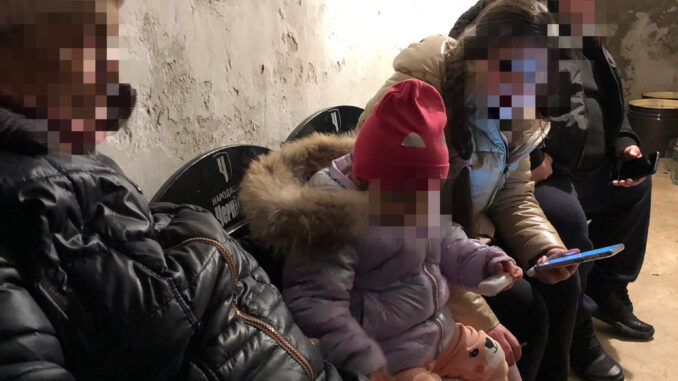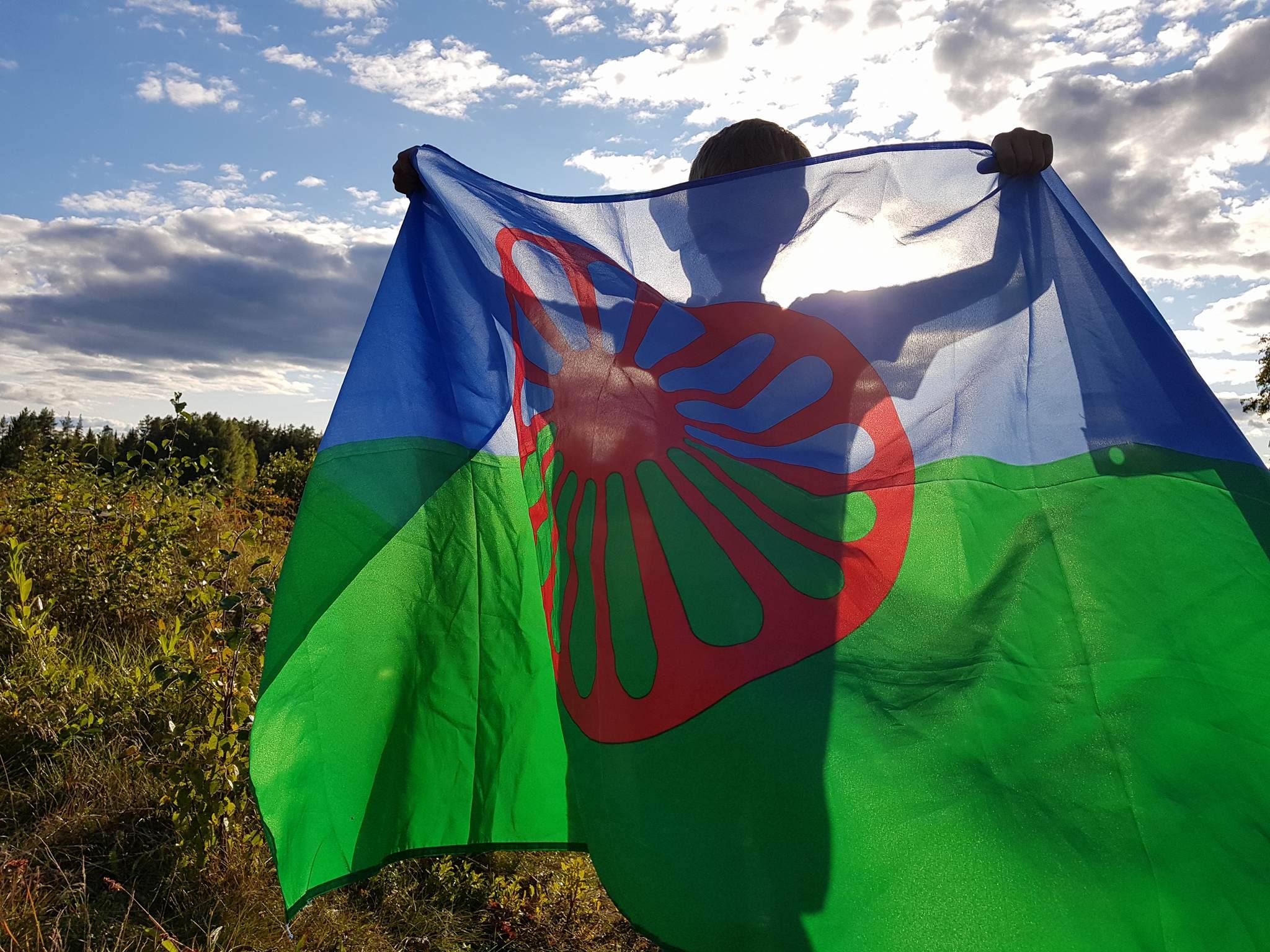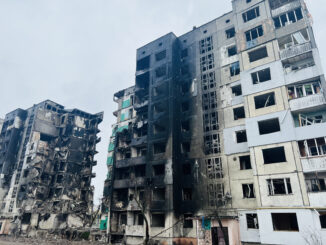
We, Maria Dumitru and Solvor Mjøberg Lauritzen, are calling Nataliia Tomenko, a young Roma woman, academic and activist, who woke up to her beloved country at war. She cannot tell us what day it is. She only knows it’s the fourth day of the war.
In the first day, I could just not believe it, it looked unbelievable, then when I heard my father screaming, my mother screaming, my grandmother, my sister… I was shocked and suffered a panic attack. Now I have breathing issues and I cannot sleep, only with pills.
Nataliia Tomenko is an artist, researcher and Roma activist. She completed her MA in Cultural Heritage Studies: Academic Research, Policy, and Management at Central European University in Vienna. She additionally holds an MA in Graphic Design from the Kharkiv State Academy of Design and Arts. Currently, she is working at ERIAC: European Roma Institute for Arts and Culture as an intern, engaged with a range of responsibilities in programing and administration. In parallel, she is working as a board member and a Creative Director at ARCA: Agency for the Advocacy of Roma Culture in Ukraine. Tomenko is also a National Volunteers Coordinator and Roma Rights Defender at the European Roma Rights Centre in Ukraine on a volunteer basis, with the aim of supporting the principal’s work in defending the human rights of Romani people across Europe and fighting against digital anti-Gypsyism. In the meantime, she engages with the visual representation of Roma history and culture, in the framework of art projects connected to Roma cultural heritage and Roma Genocide.
People are running out of food.
Nataliia and her family are in the central part of Ukraine. At the moment they are “relatively safe”. But, they spend the nights in the basement, listening to bomb alarms. The insecurity is high. Messages are ticking in from close friends and relatives from areas under more direct attack:
My aunt and her child are hiding in the basement of a Greek catholic church in Kiev. The interval of bombs is so high that they cannot even leave the basement to get more food. Now they are not allowed to leave the basement until Monday. They are running out of food.
Nataliia is further describing how all finances are directed towards the army, and that resources for civilians are scarce, including for food. Although their own safety is also at risk, they worry for friends, family and vulnerable people in the north of the country.
People are running out of food. But we cannot help others who are at the borders or in the North. We cannot send them anything.
My family needs me.
Nataliia and her 12-year old sister were offered to flee with extended family to the Polish border. Her parents encouraged them to go, and her father was crying out of fear for never seeing them again. But they chose to stay.
I see my parents and grandmother, and I know that they will not be able to survive this alone. My father suffered a heart attack at the third day of war. My grandmother is very old and sick and she needs care. We have to stay together and stay strong to survive.
Her extended family is now at the Polish borders. They are stuck in enormously long lines, for days, outside in the cold with their small kids. Families are getting separated because men cannot leave the country. The men cry, but they also understand with their mind that they have to save their family.
People are running out of food. Nataliia has herself had many panic-attacks, and at the same time she is trying to support her 12-year-old sister who is panicking. “She is crying. I am very scared. We all are”.
Roma are Ukrainians as well.
According to estimates there are between 250.000 and 400.000 Ukrainian Roma. Possible as many as 40.000 are without any identity documents. Many live in horrendous poverty in segregated Roma neighborhoods. Antigypsyism/anti-Roma racism is widely spread and highly accepted among both common people and high-stake politicians. There is a long and ugly history of anti-Roma violence where Roma have been chased from their homes and even murdered while the police have either watched the pogroms or contributed as perpetrators.
Nataliia pledge for unity: “Roma are Ukrainians as well. People should stay united now, because now is the time to help each other.” Out in the streets Roma and non-Roma Ukrainians are fighting side by side for their country.
But despite the patriotism and bravery from the Roma, they are still facing antigypsyism. Nataliia describe how her 12-year old sister was told “shut up, you gypsy” by a classmate when writing in a Viber chat established by the school to support their pupils at this time. “Even in this situation, Roma children are exposed to hate. I responded to the children in that chat by saying that: Now is the time to stay together. We need to be united”.
Nataliia has been involved in work against antigypsyism for years. She is involved in the organization ARCA, who received funding for a project to fight antigypsyism together with the European Roma Rights Center. Now ARCA is raising funds to help Roma in destitution, including Roma refugees.
The most vulnerable civilians.
Roma are suffering alongside their non-Roma fellow countrymen. The bombs don’t differentiate between Roma and non-Roma. But based on the widespread antigypsyism there is a fear that Roma are not receiving the same help as other Ukrainian citizens, and Nataliia’s family have hosted Roma refugees in their home.
In the western part of Ukraine there are extremely poor settlements with Roma.
No-one really cares about them. They don’t have jobs. Before the war they were collecting metals and selling. They are now in an even more desperate situation. They might even not have food for tomorrow. We have to do something. We don’t want civilians to die. Someone should take care of them. Provide them with food.
Nataliia is looking towards a peaceful future in her beloved Ukraine. She is already thinking of what help people will need to recover from the trauma. For children. And other vulnerable people.
My message to the Roma youth and Ukrainian youth: Many people say that they are going mad, that they are so overwhelmed. I feel the same, but only by talking to others, sharing our experiences and our families’ experiences people will hear us.
So I am encouraging everyone: Do not be silent: Speak up, because if you don’t speak no one will help your nor your family.
By Maria Dumitru and Solvor Mjøberg Lauritzen
Artikeln finns också inlänkad i Rumänska Concentrat într-un shot
Stöd romska barn och ungdomar i Ukraina
If you want to support Nataliia, her family and the Roma NGO ARCA and their humanitarian work among Roma in Ukraine:
Nataliias bank account: Nataliia Tomenko, AT32 2011 1843 5931 8100, GIBAATWWXXX
ARCA bank account:
IBAN UA913052990000026005005018534
Receiver: Youth Agency for the Advocacy of Roma culture ”ARCA”, UA, 39601, Poltava reg. Kremenchug, Pidhirna str. 14
Account with Institution Bank JSC CB ”PRIVATBANK”, City 1D HRUSHEVSKOHO STR., KYIV, 01001, UKRAINE
SWIFT: PBANUA2X
For donations in Sweden and Norway:
You may pay by Swish to 0733648966 or Vipps to 97167466. Mark your payment “Nataliia”. The funds received will be evenly distributed between ARCA and Nataliia.
Please contact solvor.lauritzen@gmail.com for more details or questions.
Att vara en oberoende tidning kostar pengar så vill du hjälpa oss med att betala vårt fika får du gärna swisha en slant till 123 242 83 40 eller bg: 5534-0046
Vill du annonsera eller sponsra, synas eller höras i våra media?
Kontakta oss på redaktionen@dikko.nu
eller ring 0768 44 51 61
IBAN: SE19 9500 0099 6042 1813 4395
BIC: NDEASESS





5 Trackbacks / Pingbacks
Kommentarerna är stängda.